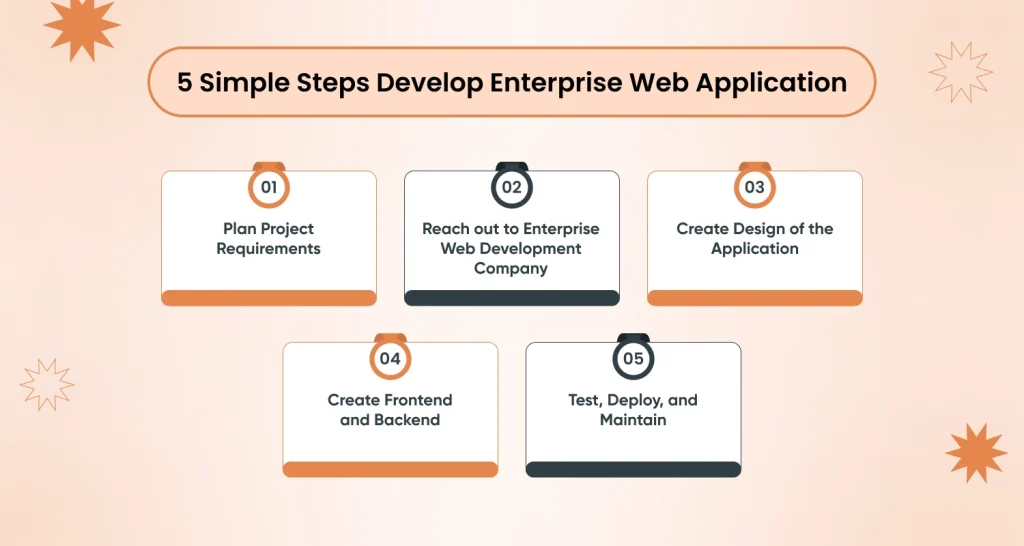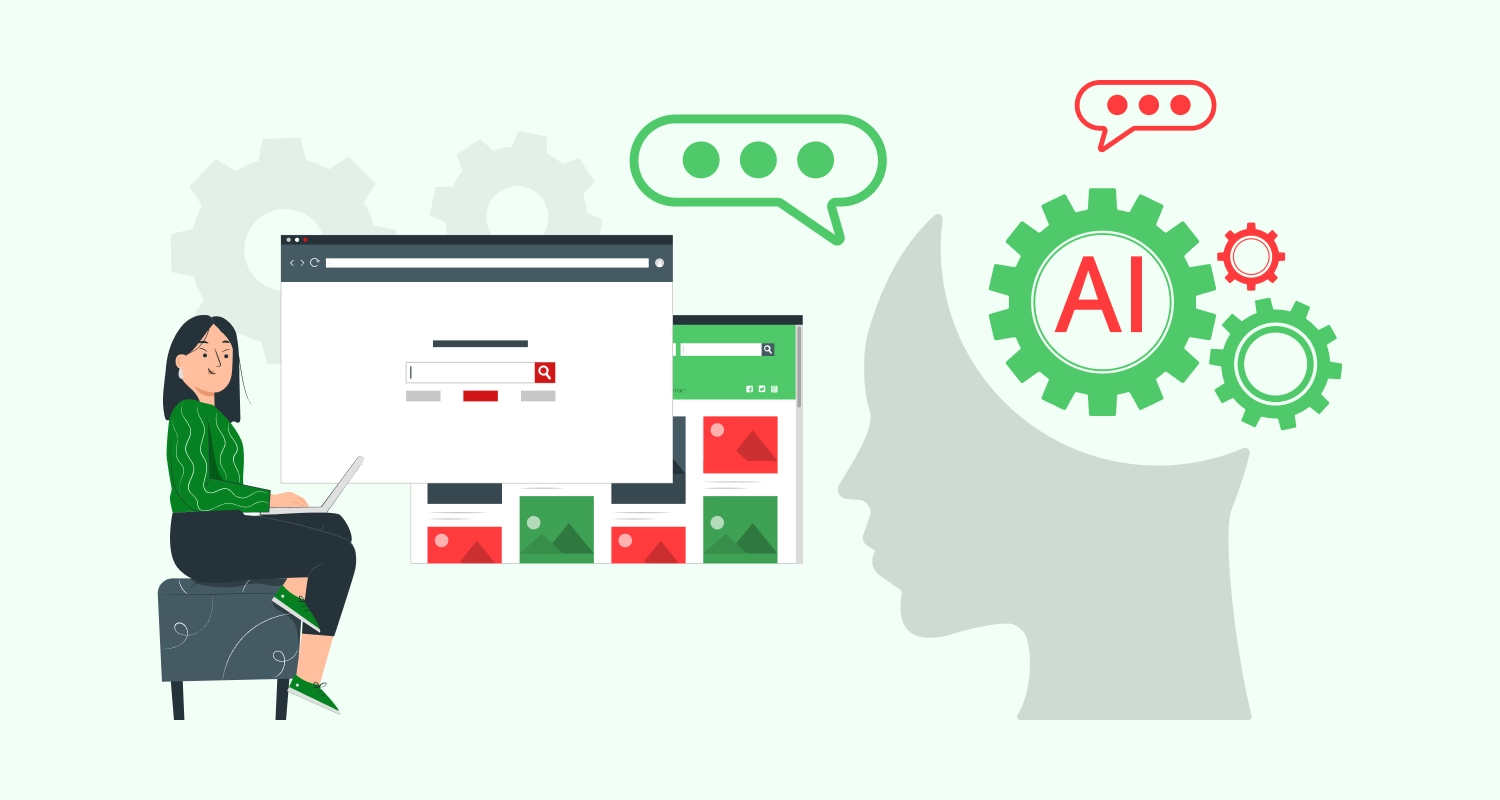Large organizations cannot afford to ignore or underthink their approach to enterprise web development in order to be competitive in today’s digital market. An experienced web development company can improve user experience, customer happiness, and company efficiency. However, a lack of web development planning can result in missed sales, poorer conversion rates, and security breaches.
When we think about an enterprise web application solution, the first thing that comes to mind is, does my company require it?
Yes, possibly. A web application is necessary if you own a company or a huge corporation. Your business cover is a web-based enterprise application that presents and handles all business processes effortlessly.
Enterprise web applications improve business efficiency and operations such as internal activities, data management, security, employee engagement, and more. Let’s start with a basic understanding.
What is an Enterprise Web Application?
To optimize company operations and enhance decision-making, enterprise web apps place a heavy emphasis on security, integration, customization, and user experience. The primary purpose of enterprise web development is to improve communication and interaction inside the organization and with consumers by creating simple, scalable apps.
The corporate website, online apps, and enterprise software are all web application examples. While these may use various online tools, they are frequently integrated and use comparable enterprise systems, frameworks, servers, and databases. Each of these technologies is critical for the digital success of a large organization.
5 Simple Steps Develop Enterprise Web Application

The following is a five-step process for establishing a corporate web application.
1. Plan Project Requirements
To begin, you must thoroughly identify the goal of your project, the problems it will solve, and the exact criteria required to reach business objectives.
This should include the following:
- Outline your enterprise web app’s functionality and features in detail.
- Define your organization’s present pain areas and how your solution addresses them.
- Determine your company web app’s clear value proposition.
- Determine which technologies or systems your company web app should support.
- Conduct market research to have a better understanding of the competitive landscape.
- Identify potential threats to your company’s web app.
2. Reach out to Enterprise Web Development Company
You must now contact a trustworthy enterprise web app development company after you have understood and gathered your project requirements. You can hire web developers as per your needs and budget.
To create an enterprise web app, contact top-rated organizations that offer progressive web app development services. Most businesses have dedicated teams of expert engineers, designers, and project managers who can understand your needs and offer customized solutions.
But how do you choose an enterprise application development company?
Let’s break it down:
- Examine the portfolio, case studies, and years of expertise in related industry.
- Check to see if the organization is capable of utilizing new technologies.
- Examine client testimonials and get references from well-established businesses.
- Check that the company’s development team is large enough to manage your project.
- Understand the development costs and price structure for the enterprise web app.
3. Create Design of the Application
After you’ve decided on an enterprise web development firm, the BA team will construct a wireframe and design the UI/UX of your web app. In this step, you’ll collaborate with your design and business analyst teams to create an excellent user experience and website structure for your application. This method entails producing wireframes and prototypes that provide a visual representation of the layout of your application.
Consider user interface (UI) components such as colors, fonts, and overall style, as well as user experience (UX) to ensure the app is simple and easy to use.
4. Create Frontend and Backend
The development team creates the front-end and back-end of your enterprise web app once the UI/UX is complete. Front-end and back-end development are critical components of the establishment of your online project.
Front-end development: To speed up development and simplify complex processes, web app developers employ HTML, CSS, and JavaScript web development frameworks such as AngularJS, ReactJS, or Vue.js. It entails creating visual and interactive features like buttons, forms, and animations that appear as you use the app.
Back-end development guarantees that when you click a button or fill out a form, the app knows what to do with the data. It entails securely storing data, protecting your login information, and connecting the app to databases where all of the data is saved.
Throughout the code development process, your program is subjected to several changes until the intended outcome is not produced. A project manager assigned to you determines the milestones for delivering the corporate web app on schedule.
During this step, you must do rigorous quality testing to guarantee that your web apps execute properly and give a nice user experience.
5. Test, Deploy, and Maintain
You ensure that your application meets the highest functional, security, and performance standards in the final phase. Your team performs a variety of tests to identify and resolve issues, including functional, usability, and performance testing.
When the testing phase is finished, the deployment phase begins. Finally, in order to keep your web app running properly and safely, you must monitor and manage it on a frequent basis. Regular maintenance will improve the efficiency and longevity of your web app.

What are the Features of Web Applications Enterprise Applications?
With enterprise web apps, you may create strong modules for a variety of services such as HR administration, business processing, CRM, ERP, and data management, among others. The number of features you want to incorporate into the application is determined by the program’s complexity and your overall business requirements. Let’s have a look at some notable features that can help optimize the web application and provide a better experience to end users.
Integration with the Cloud
Cloud integration is one of the critical characteristics that allow firms to create an efficient, scalable, and cost-effective application. With cloud support, you can manage resources on the go and create powerful solutions for specific business requirements. Cloud integration also improves efficiency and accelerates business.
Automation of Business Processes
This elements in enterprise web applications can help to optimize administrative duties and overall company efficiency. Automation also contributes to more dependable data streams, faster processing, and improved company performance via sturdy digital modules.
Security
With web apps, you can build robust security methods and protocols at many levels to secure the privacy, safety, and security of your company data. With solid security, you can meet compliance standards and practice good digital hygiene, which is crucial for modern enterprises.
Compatibility Across Several Platforms
Multi-platform compatibility ensures that your program is portable and scalable. To maximize the software’s reach and overall usability, your web application should be interoperable with different platforms, systems, devices, and frameworks.
Analytics
Integrating powerful analytical tools into your company’s online application aids in decision-making, personalization, and performance optimization. It also offers accurate predictive modeling, excellent retention, and improved messaging. Various analytical tools can be used to harness data and generate relevant insights, which is critical for speeding business success.
Electronic payments
Incorporating digital payment methods into your company’s web application aids in the automation of payment processing and accounting duties. You can successfully integrate digital payment capabilities using numerous APIs or plugins to develop dependable and simple payment modules for clients.
Integration into society
Embed social media sharing capabilities via social media integration APIs to increase brand awareness, reach and engagement, and exposure for your business processes. One of the most well-liked aspects is social media integration.
Advantages of Enterprise Web Application Development
Reduces Costs
Web apps can automate a variety of repetitive operations, lowering labor hours, hardware expenses, and maintenance costs. In addition, because web-based programs enable remote work, the cost of office space and overhead is reduced. Adopting a cost-effective approach through enterprise web development not only increases productivity but also assures effective cost control throughout the organization.
Ensures Uninterrupted Cross-Platform Compatibility
The enterprise web app makes use of web technologies to ensure that your application runs seamlessly across a variety of platforms, including desktop computers, laptops, tablets, and smart mobile devices. This helps to eliminate the need for platform-specific development, expedite updates, and reach a wider audience.
Provides a High Degree of Security
When considering any type of software, security should be a primary priority. Enterprise web applications are distinguished by security features such as data encryption, secure authentication, and frequent security updates. Rest confident that your web application is well-protected against cyberattacks and unauthorized access by adhering to the demanding security requirements.
Increases Scalability Options
Enterprise web apps allow you to scale up your resources and server capabilities to meet the changing needs of multiple users. This ensures that high loads are handled properly, that performance is maintained, and that the user experience is smooth. This scalability ensures that your business processes continue to run, whether coping with an increase in client orders or managing increasing data traffic.
How Much Does it Cost to Develop Enterprise Web App
The costs of Enterprise Web Application Development are heavily influenced by the solution’s business requirements, features, characteristics, and complexity. It might be anything from $20,000 USD to much more.
The firm should consider several factors of the cost of Enterprise Web Application Development based on the number of fields in the system when preparing the ERP web application budget.
According to the data, large corporations with varying demands pay far more than small businesses. Because large organizations have diverse needs, many verticals, and more users and functionality.
Examples of Enterprise Web App
- Customer Relationship Management Software, such as Salesforce CRM, Zoho CRM, HubSpot CRM, and others, are examples of Enterprise Web Applications.
- ERP software, such as NetSuite, SAP Business, Bitrix24, and Tally. ERP 9, Dynamics, and other software.
- BCP software, such as Microsoft R Server, Folder Lock, GoodSync, Spanning Backup, Nero, and others.
- TMS (Treasury Management System), such as Oracle Treasury, tm5, and others.
- BI software, such as Zoho Analytics, Sisense, MicroStrategy, SAP Business Intelligence, and others.
Conclusion
Are you ready to create an Enterprise Web Application for your company? This blog has provided you with an understanding of the process, benefits, cost, time, and timetable for establishing corporate website solutions.
So, if you’re seeking a company that can assist you in optimizing business processes or creating unique web application solutions, your quest is over. We are here to help because we have served a range of sectors and have over 1000+ clients worldwide.
Let’s connect and discuss your business enterprise needs. We can work together to design a successful web application that is suited to your company’s needs.
Frequently Asked Questions
What Is an Enterprise Web Application?
An enterprise web application is a piece of custom software that can be viewed online via a browser. It is a software module that may deliver many goals across functions, such as internal communications, and a wide range of external services such as CRM – Customer Relationship Management.
What Is the Duration of Developing an Enterprise Web App Solution?
The timeline for developing a web app might vary greatly depending on the scale and complexity of the project. Simple online apps with simple features can be developed in 4-6 weeks, however, more complicated web apps with advanced features can take 6-12 months or longer.
What Is the Typical Cost of Developing an Enterprise Web Application?
Ideally, your entire application development should be covered by a monthly retainer, and the project’s duration should range from one to three months, depending on the number of iterations and overall features. Any reputable tech business in India will likely quote a starting price of $20k USD and increase it based on the features.
Can You Provide Examples of Successful Enterprise Web Applications?
Some of the examples of successful enterprise web applications in the market are:
Wikipedia
Vimeo
Etsy
Yahoo
Flickr
Mailchimp
Badoo
Why Should My Organization Invest in an Enterprise Web Application?
Some of the key reasons or benefits of investing in an enterprise web app are:
Enhanced customer experience
Performance and productivity
Automation
Improved ROIs & sales-boosting opportunities
Easy data sharing
Frequently Asked Questions
An enterprise web application is a piece of custom software that can be viewed online via a browser. It is a software module that may deliver many goals across functions, such as internal communications, and a wide range of external services such as CRM – Customer Relationship Management.
The timeline for developing a web app might vary greatly depending on the scale and complexity of the project. Simple online apps with simple features can be developed in 4-6 weeks, however, more complicated web apps with advanced features can take 6-12 months or longer.
Ideally, your entire application development should be covered by a monthly retainer, and the project’s duration should range from one to three months, depending on the number of iterations and overall features. Any reputable tech business in India will likely quote a starting price of $20k USD and increase it based on the features.
Some of the examples of successful enterprise web applications in the market are:
- Wikipedia
- Vimeo
- Etsy
- Yahoo
- Flickr
- Mailchimp
- Badoo
Some of the key reasons or benefits of investing in an enterprise web app are:
- Enhanced customer experience
- Performance and productivity
- Automation
- Improved ROIs & sales-boosting opportunities
- Easy data sharing







